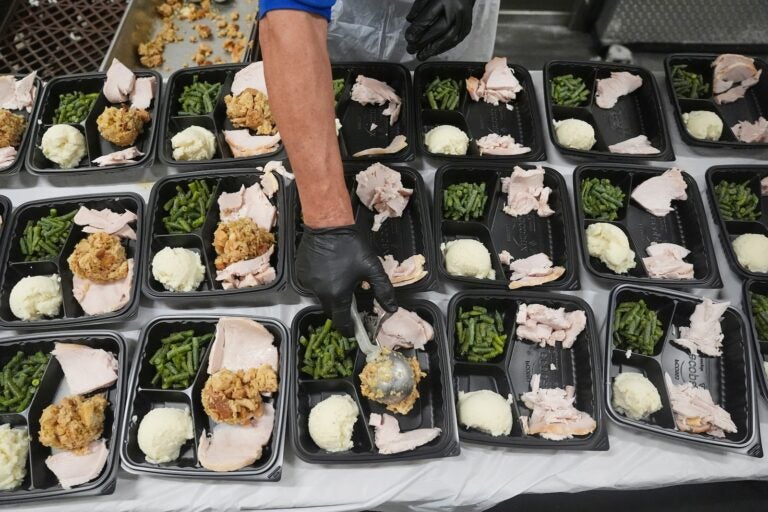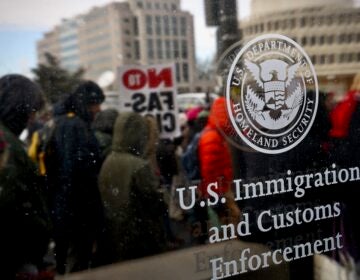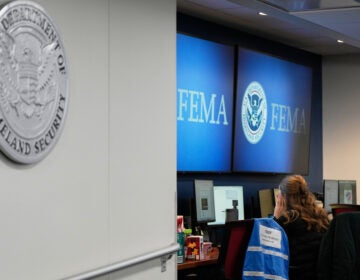SNAP funding: Here’s the latest on November benefits and how the Philly region is impacted
The food assistance program serves close to 1 million people in the Greater Philadelphia area.

A volunteer prepares meals at the Philabundance Community Kitchen in Philadelphia, Thursday, Oct. 30, 2025. (AP Photo/Matt Rourke)
SNAP funding: What to know
- 42 million people — about 1 in 8 Americans — rely on SNAP
- Locally, that includes nearly 2 million people in Pa., with roughly 685,000 in the Philadelphia region, and more than 800,000 in New Jersey
- Here’s how to find other free food resources in the Philly region and in South Jersey, and how to help
After the longest federal government shutdown in history, states are working to send full Supplemental Nutrition Assistance Program benefits to millions of recipients.
About two-thirds of states, including Pennsylvania, had issued partial or no benefits to SNAP recipients before the shutdown ended late Wednesday.
The U.S. Department of Agriculture on Thursday told states to issue full November SNAP allotments promptly. Due to the interruption in benefits, the department will waive the federal work requirement that most adult SNAP recipients work, volunteer or participate in job training for at least 80 hours a month for November.
Pennsylvania finished distributing full SNAP benefits to recipients as of Friday morning, the state Department of Human Services said in a statement.
As food banks, pantries and other charitable support systems “stabilize and restock,” DHS Secretary Val Arkoosh said residents should continue to support their charitable food network, if able.
Pennsylvanians with questions about their SNAP benefits can call the DHS Statewide Customer Service Center at 1-877-395-8930. Philadelphia residents should call 215-560-7226.
How did we get here?
President Donald Trump signed a government funding bill Wednesday night, hours after the U.S. House passed the measure on a mostly party-line vote of 222-209. The legislation to reopen the government, which funds SNAP through September 2026, brought an end to a back-and-forth legal battle over the program’s funding.
Pennsylvania’s eight Democratic House members all voted no, with concerns over expiring Affordable Care Act subsidies left unaddressed in the legislation. U.S. Rep. Dwight Evans, who represents portions of Philadelphia under the 3rd Congressional District, was among Philly-area House members who spoke out against the deal, calling a pledge by Republicans to address the looming spike in health care premiums an “empty promise.”
The commonwealth’s 10 Republican members — including U.S. Rep. Brian Fitzpatrick, who represents Bucks County and parts of Montgomery County — all voted yes. Fitzpatrick bemoaned the cost Americans paid during the shutdown as a result of what he called “political gamesmanship.”
The measure to end the shutdown passed the U.S. Senate on Monday. Pennsylvania’s U.S. Sen. John Fetterman was among eight Democratic lawmakers to break party ranks in approving the deal, to the displeasure of Philadelphia-area U.S. House members. Pennsylvania’s U.S. Sen. Dave McCormick joined almost every Republican in voting “yes.”
The USDA had told states in late October that it would not fund SNAP benefits for November during the government shutdown, leading Democratic-led states like Pennsylvania, New Jersey and Delaware to sue the Trump administration.
The Trump administration argued that the funds were “not legally available to cover regular benefits, a departure from the U.S. Department of Agriculture’s shutdown lapse plan, which says “Congressional intent is evident that SNAP’s operations should continue” in the event of a shutdown.
How many people rely on SNAP in the Philadelphia region?
SNAP provides food assistance for 42 million people across the U.S. About 1 in 8 Americans rely on the program. Among them are 2 million people in Pennsylvania, including more than 713,000 children and 697,000 older adults.
Philadelphia is home to nearly 472,000 SNAP recipients, or roughly 30% of the city’s population.
Across the city and its collar counties, nearly 685,000 residents are SNAP enrollees, or about 16% of the area’s population.
Delaware County sees the highest percentage of SNAP recipients among Philly’s suburbs, with roughly 75,000 enrollees (13%), compared with more than 46,000 and nearly 63,000 in Bucks and Montgomery counties, respectively (7% each) and over 29,000 in Chester County (5%).
Nationwide, nearly 70% of SNAP recipients are children, older adults or people with a disability, according to the U.S. Department of Agriculture.
How have food banks been impacted?
In Pennsylvania, the delay in SNAP benefits came against the backdrop of a state budget impasse, separate federal cuts and new SNAP work requirements.
A delayed state budget — which lawmakers advanced Wednesday, more than four months late — had stalled millions in aid from going to food banks, and such organizations had already been feeling the strain before the federal government shutdown.
The massive tax and spending bill passed by Congress in July included major cuts to SNAP.
The legislation extended Trump’s 2017 multitrillion-dollar tax cuts and cut Medicaid and food stamps by $1.2 trillion.
The so-called “big, beautiful bill” also included new work requirements for SNAP. Adult recipients under 55 who don’t have children must now prove they work or volunteer at least 20 hours a week. In November, veterans and people between the ages of 55 and 64 must also comply with the change.
SNAP eligibility was also removed for some immigrants, including refugees.
Up to 144,000 Pennsylvanians and up to 45,000 Philadelphians risk losing access to SNAP as a result of the new requirements, according to the state.
“We’re worried that many people may lose access to SNAP not because they’re no longer eligible, but because they don’t get the correct piece of paper in and processed at the right time,” Lydia Gottesfeld, an attorney at Community Legal Services of Philadelphia, previously told WHYY News.
Separately, the government shutdown left more than 66,000 federal workers in the state without pay.
A surge in demand due to paused SNAP benefits and shutdown furloughs exacerbated existing pressure on local food banks, leading to long lines and emotional upheaval for recipients heading into the holiday season.
Share Food Program, which serves the Greater Philadelphia region, cut its budget by 20% this year because of the state budget impasse, executive director George Matysik told The Associated Press.
“Any time we have a crisis,” he said, “it’s always the working class that feels the pain first.”
WHYY News’ Zoë Read, WITF’s Jaxon White and The Associated Press contributed reporting.

Get daily updates from WHYY News!
WHYY is your source for fact-based, in-depth journalism and information. As a nonprofit organization, we rely on financial support from readers like you. Please give today.





